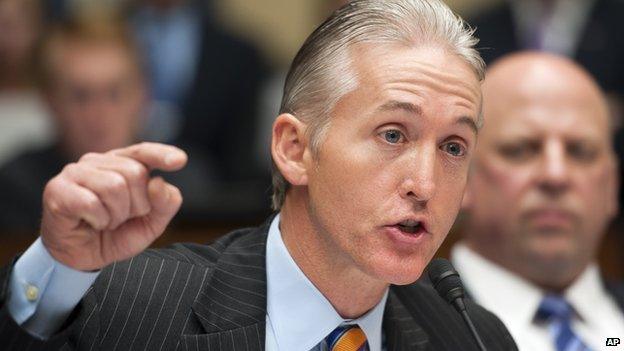The Republican Benghazi inquisitor
- Published

Representative Trey Gowdy says his Benghazi investigation matters "because four of our fellow citizens were murdered"
A review of the best commentary on and around the world...
Today's must-read
On Monday, Speaker of the House John Boehner announced that Republican Representative Trey Gowdy of South Carolina will chair the proposed special committee investigating the 2012 attack on the US consulate in Benghazi, Libya.
Gowdy was first elected to Congress in 2010 after having served in South Carolina as a federal prosecutor. On Thursday he took to the pages of USA Today to explain, external why this new congressional investigation - it would be the 14th conducted, external so far - is worth undertaking:
Benghazi matters because four of our fellow citizens were murdered under terrifying circumstances. Benghazi matters because a diplomatic facility emblematic and representative of our country was attacked and burned on the anniversary of 9/11. Benghazi matters because Americans deserve to know the truth from those entrusted to lead and govern.
He writes that there are witnesses who have yet to be heard and documents that have been withheld by the Obama administration or "are so heavily redacted as to be meaningless".
"May justice be done, though the heavens fall," he concludes, quoting the old judicial maxim.
Mr Gowdy's methodical work ethic combined with a flair for courtroom dramatics make him "hard for the Obama administration to immediately dismiss", writes, external Slate's Dave Weigel.
The Washington Post's Dana Milbank is more dismissive, external, calling Mr Gowdy "chief prosecutor in the show trial of the president".
If the Benghazi investigation gains traction, the second-term congressman could become a television fixture.
Even if it fizzles, he'll be a household name on Fox News.
Afghanistan
Nato leaves behind a mess, external - Canada "rightly" joined the military intervention to fight the Taliban in Afghanistan, writes Haroon Siddiqui in the Toronto Star, and is "doing far more than its share".
He says the occupation has been a disaster, however, "due mainly to a series of American mistakes born of cultural ignorance, imperial arrogance, incompetence, indiscipline and political indecisiveness".
The war has not been won, he writes, the government may collapse, and the people of the region no longer see the Nato forces as allies.
"This is the mess we have after a war that has lasted longer than either of the world wars," he concludes.
Colombia
A Medellin Renaissance, external - A city "once notorious for its drug gangs", writes Columbia University Prof Joseph E Stiglitz, Medellin, Colombia, "now has a well-deserved reputation as one of the most innovative cities in the world".
With a sophisticated gondola system linking poor neighbourhoods in the hills to the city centre, improved education and innovative public spaces, he says, Medellin serves as an example to communities around the globe.
"With political gridlock afflicting so many national governments around the world, forward-thinking cities are becoming a beacon of hope," he writes.
Thailand
A nation torn in two, external - Reaction to the Thailand Constitutional Court's removal of Prime Minister Yingluck Shinawatra has been split according to "political leanings", write the editors of the Nation.
"The week's developments only confirmed the depth and breadth of the ideological chasm dividing the nation," they write. One person's "checks and balances" is another's "judicial coup".
This makes achieving any lasting reform difficult, they say. These differences must be taking into account, but any changes "must maintain the ultimate democratic value of freedom of thought".
Russia
Putin isn't backing down, external - On Wednesday Russian President Vladimir Putin called for separatists in eastern Ukraine to postpone their referendum on independence, writes the American Interest's Lilia Shevtsova, but that doesn't mean he's given up meddling in Ukrainian affairs.
She says Mr Putin may have decided voting "under the barrel of a gun" wouldn't receive international acceptance, the sanctions may have forced his hand or he could be trying to position Russia as a "neutral arbiter".
She goes on to provide a list of implications for global security, including Russia's attempts to reshape post-Cold War geopolitics and right historical wrongs.
"Putin has unleashed a tide," she concludes, "and nobody knows what it will bring for Russia and its leader."
BBC Monitoring's quotes of the day
A pair of Middle Eastern commentators react to news of a truce in war-torn Homs and the subsequent withdrawal by Syrian rebels.
"This is not the first such direct contact between the rebels and the regime, and it can now be a new way out of the confrontations that have worn both sides down without enabling either of them to gain a definitive victory. Given the failure of the UN-sponsored political solution and the regime's determination to end the revolution by force, the choice for truce or a ceasefire in areas where clashes have been taking place may improve the chances of calming the situation in some areas. This will not lead to reconciliation or end the four-year conflict, but it may give both sides a chance to take a breath and allow aid to reach the besieged areas, which are packed with civilians." - Usamah al-Sharif in Al-Dustur, external.
"There is no doubt that the evacuation of Homs is a victory for the regime, although it is not a clear-cut surrender... The Syrians and the world should now be on the lookout for what happens to a city that has become a symbol of state barbarism." - Abd-al-Wahab Badarkhan in Saudi-owned newspaper Al-Hayat, external.
Have you found an interesting opinion piece about global issues that we missed? Share it with us via email at echochambers (at) bbc.co.uk.